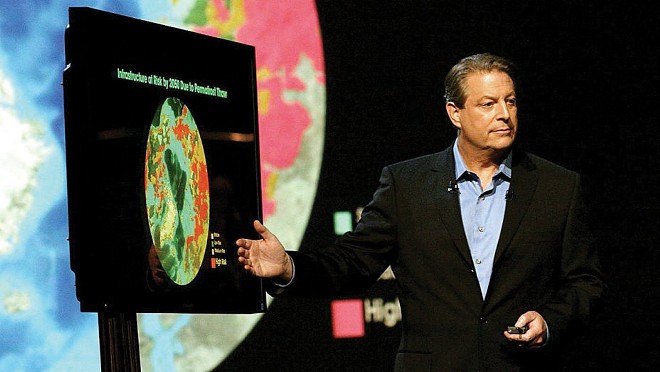When the producers at Participant Productions, the company behind the 1996 documentary film An Inconvenient Truth, began considering a sequel to the movie about the dangers of climate change, they reached out to directors/producers Bonni Cohen and Jon Shenk, veteran filmmakers who would be capable of following up on the Oscar-winning original.
“The original director, Davis Guggenheim, thought it would be important to bring a new team on board to perhaps find a new way of looking at the story,” explains Shenk in a recent conference call with Cohen. The resulting movie, An Inconvenient Sequel: Truth to Power, opens at the Cedar Lee Theatre tomorrow. “We spent an entire day with [Vice President] Al [Gore], getting a 10-hour version of the slide show, which is an amazing experience. We wanted to spend a lot of time with Al, filming him behind the scenes as he did his climate work and traveled to Paris and the Philippines and Greenland as he tried to solve the climate problem.”
The directors noticed there was natural drama going on as the cost for wind and solar had come down so much that it made renewable energy a viable option.
“It was a real chance for the world at large to start moving toward solutions for the climate crisis,” says Shenk.
In the sequel, Gore tirelessly travels the globe, spreading his message that saving the planet from climate change should be a priority for both developed and developing countries. Through it all, the specter of soon-to-be-President Trump looms like a dark cloud, and we see snippets of Trump badmouthing environmentalists throughout the movie.
At one point in the movie, Gore even meets with Trump behind closed doors, entering the hallowed halls of Trump Tower for a meeting with the man.
“They did meet a couple of times,” says Shenk. “He has a relationship with Ivanka [Trump], as well, who has shown interest in pursuing the right path for climate change. Early on, he was reasonably hopeful that the President might stay in the Paris Treaty. He thought there was a 50-50 chance he might go that way. Unfortunately, he didn’t.”
In fact, the filmmakers had to scrap the movie’s original ending when news broke that Trump had pulled the United States out of the Paris climate agreement, a decision likely to have catastrophic results when it comes to containing the dangerous greenhouse gasses contributing to climate change.
“We have to avoid the impulse to be reactive to everything that this administration seems to do,” says Cohen when asked about the movie’s new ending. “We thought long and hard about how to respond to the various promises that Trump has made about the environment. We make quick work of it at the end of the film. It’s the tragedy of where we are.”
The movie, however, still provides a sense of hope at the conclusion.
“We quickly turn toward the good work of the American people,” says Cohen. “People are even more galvanized since Trump pulled out of Paris. The film ends on a hopeful note. We witness mayors and governors and ordinary citizens standing up and saying they will lead on the issue.”


